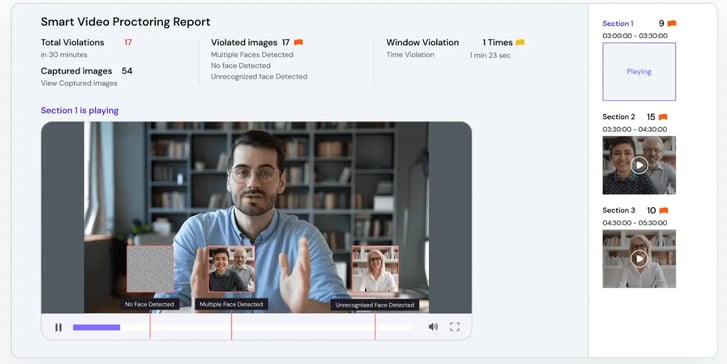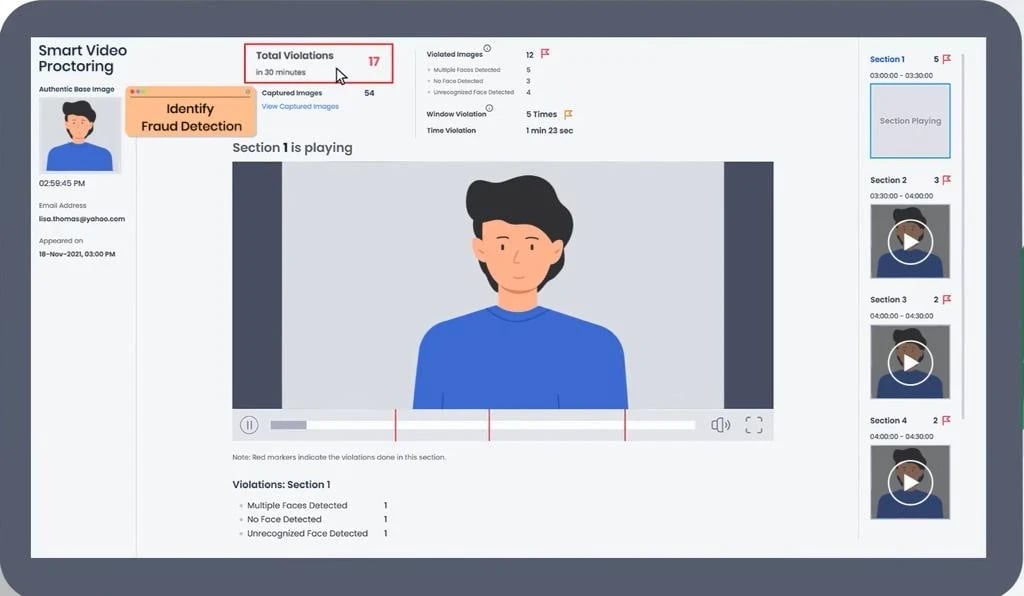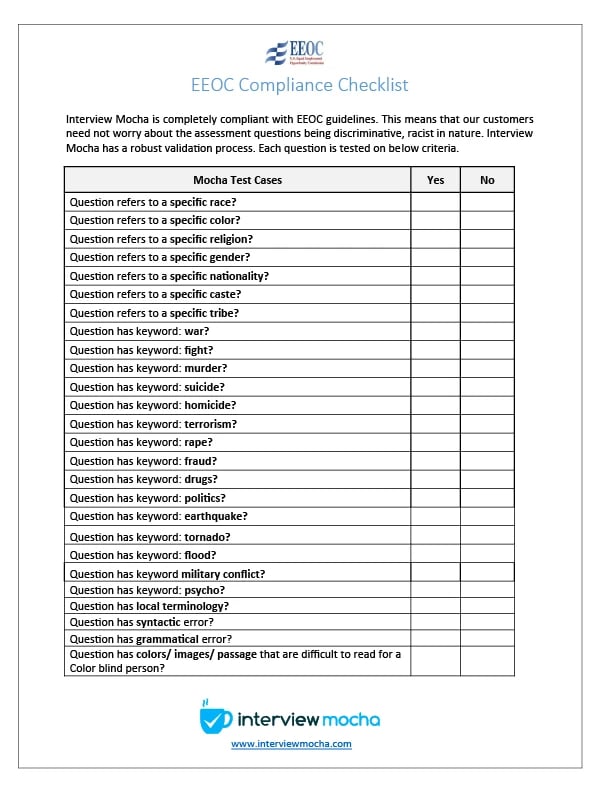Online proctoring is often met with a lot of skepticism—both from the candidate and the organization at large. HR managers struggle with valid online proctoring privacy concerns related to online skills assessments such as:
- Is online proctoring safe?
- Can it ensure data integrity, privacy, and security?
- Can the candidates take the test honestly without supervision?
- Does online proctoring actually work?
The short answer: Yes.
Online proctoring or remote proctoring is the process of using software to monitor candidates remotely during a test. It can be done in three ways:
-
Live Proctoring, which is a real-time proctoring system where a human proctor is present
- Recorded Proctoring, which involves taking a video recording of the candidate during the test
- Automated Proctoring, which is a more advanced form of proctoring where a human does not need to be present at all times
So, the real question becomes: "Why is online proctoring done by companies, and how does an online proctoring solution help?"
Here's how:
- Helps prevent cheating instances and hire job-fit tech candidates
- Allows companies to hire quality candidates quickly and efficiently
- Empowers recruiters to make intelligent talent decisions without personal bias
- Enables recruiters to understand how and when a cheating instance occurred
- Eliminates chances of candidate impersonation and creates a safe-assessment browser experience
Clearly, the benefits of using an online proctoring software are aplenty. In this article, we will look at some of the most pressing online proctoring privacy concerns organizations and candidates may have.
|
Looking for advanced AI-enabled Proctoring features? Leverage iMocha's smart 6-level proctoring mechanism to ensure the integrity of remote assessments. |
Top 13 Candidate Concerns
Here are some of the most important concerns candidates have before and during an online assessment:
1. Focus: Am I the main focus of the webcam monitoring?
2. Access: Does the company have access to my computer at all times?
3. Unease: Is someone always present to observe the exam?
4. Data concerns: Do I have to give the online proctoring firm any sensitive personal information (aside from my name, address, and ID number)?
5. Data integrity: Is my data being shared with other parties against my will?
6. Invasion of privacy and a feeling of intrusiveness: Am I being monitored by a human proctor or an automated system?
7. Security vulnerabilities: Will I be asked to hand over the administrator rights to my device? Will this put me at risk of a dangerous security invasion?
8. Data theft: Is there a risk of my personal information being hacked or leaked during online proctoring?
9. Personal device access: Will the tool ask me to grant access to my personal devices, such as my laptop and smartphone?
10. Biometric data: Will the tool collect biometric data such as facial recognition, voice analysis, etc.?
11. Personal documents: Will I need to show personal documents, such as IDs or passports, during the online proctoring test?
12. Video footage: Will I need to provide front camera access to start the video recording? Is that safe?
13. Unfair/bias: Will I be wrongly flagged for suspicious behavior?
Prior to conducting the online proctoring test, it is paramount to address these candidate concerns by providing all the relevant information clearly, succinctly, and honestly. Many companies opt for candidate assessment tools that are EEOC compliant, prioritize candidate security, and place a strong emphasis on fostering candidate engagement.
12 Valid HR and Company Concerns
Now, let's look at some of the most critical online proctoring privacy concerns organizations may have:
1. Data-sharing: Does the data collected need to be shared elsewhere with a third party?
2. Software security: Is the software capable enough to bypass or prevent phishing attacks?
3. Data encryption: Is the data being collected securely, and is it being encrypted by the company server?
4. Monitoring internet activity: Will the tool monitor the candidates' internet activity, including websites visited and searches performed?
5. Artificial intelligence integrity: Will artificial intelligence be able to detect suspicious behavior? If it does so, how can we tackle concerns relating to bias or accuracy from the candidate?
6. Technical issues: What happens if the tool experiences technical issues, such as connection problems/software glitches? Will this compromise the privacy of candidates, and to what extent?
7. Legal issues: What are the legal issues relating to the use of online proctoring? What are the legal rights of the candidates and the jurisdiction of my company?
8. Data storage: How will the data be stored safely?
9. Candidate integrity: How can we ensure candidate integrity at all times?
10. Data breach: What's the protocol during a data breach?
11. Identification: Will we need multiple ID verification to ensure that it's the same candidate? Will this lead to data leaks and privacy issues?
12. Data risk: If a data leak happens, is there an insider involved within the company?
In addition to the candidate's concerns, it is important to iron out the common pain points and questions organizations may have. Reassuring them to use a robust and high-quality online proctoring tool such as iMocha can help.
Here's a webinar on how: iMocha AI-enabled proctoring ensures seamless hiring for technical roles
|
Concerned about the candidates' integrity during assessments? Leverage iMocha's AI-based proctoring technology that raises flags for suspicious activities. |
The Big Solution: Ensure Assessment Integrity with iMocha's Remote Proctoring Solution
To stay on top of an organization's online proctoring privacy concerns, an AI-powered proctoring software like iMocha can help. Here's how.
One, iMocha follows GDPR Policies and EEOC Guidelines to deliver a hyper-secure and anonymous proctoring experience.
Two, iMocha's AI-powered proctoring analysis empowers recruiters to:
- Intelligently filter candidates who have violated the proctoring limits without opening the report
- Access data-rich information such as proctoring insights, violation severity reports, accurate violation markers, and analytical efficiency flags
- Reduce the recruitment time drastically
Three, iMocha's smart video proctoring feature comes power-packed with useful features such as face detection, identity cheating intensity, contextual understanding of cheating, and identifying the exact instances of cheating:
Four, iMocha offers a robust Proctoring Policy Checklist that organizations can share with candidates before the skill assessment starts:
All in all, iMocha empowers recruiters to improve assessment integrity and leverage diverse remote proctoring options. Here's how iMocha works:
- Real-time automated proctoring
- Facial recognition at the start of the assessment
- Face authentication throughout the test
- Browser patroling with warnings every time a candidate tries to move out of the test window
- Automated real-time warnings
- Copy-paste locking to prevent candidates from cheating off of the internet
- Cheating detection flags to make the right decisions from a pool of candidates
- Full audio/video recording
- IP change log is maintained if the candidate tries to switch to another computer or asks a friend to take the exam from another location
- Alerts relating to the time log history of the entire event, which includes violations
Prevent cheating with iMocha’s fraud detection mechanism
Check out the Top 15 Best Proctoring Software to Prevent cheating
|
Ready to take your recruitment process to the next level with AI-based proctoring? Our experts can show you how companies like Capgemini and Ericsson have benefitted from iMocha's proctoring solution. |
Privacy-Related FAQs: An Organizational Perspective
Q. What kind of data is being collected, and for what purpose?
It is important to:
- Understand the nature, extent, and purpose of data being collected during the assessment process
- When processing personal information, cross-check whether the data is in compliance with the applicable privacy laws
- Follow data encryption/data minimization, which is collecting and using only the necessary personal data (think: name, email address, and ID number) to proctor the test
- Understand whether you need image, audio, and screen recording to evaluate effectively
- For technical details, only collect data such as browser type, operating system, and/or IP address
Q. How do we communicate clearly and honestly about data collection?
Ensuring that candidates are fairly prepared for the online test is important. Make sure to provide clear information on the following:
- What data is being collected early on in the process
- Why the data is being collected
- What the data will be used for
Recruiters can provide test candidates with a notice on signing up for the exam or during the system check. They can also offer the same notice on the test date. Use a pop-up window to avoid the risk of the message being overlooked.
Q. Are we fully aware of the test taker's rights?
Privacy laws are constantly being framed and updated to avoid trespassing the test taker's privacy. This is why testing organizations must be:
- Aware of the rights that the candidates have
- Understand who will be responsible for asserting and responding to said rights
- Gauge the timeframe for a response and roll out an appropriate response for each case
Q. Is the security up to date?
Organizations must tackle the issue of data security and privacy seriously during online proctoring.
For instance, according to the GDPR, organizations require “appropriate technical and organizational measures” basis the level of risk involved.
So, keep updating the security policies and ensure that the information security management system is up to date.
Q. How will the data be shared with a third-party entity?
If leveraging a third party to conduct the online proctoring test, make sure to:
- Implement the right due diligence and ensure data trust between the organization and the third-party entity
- Ask the following questions when onboarding a third-party vendor:
- Is the vendor well-established in the market?
- What kind of demonstrable experience does it have in delivering your specific needs?
- Does the vendor understand the privacy laws applicable to your organization?
- Will they provide legally-binding contracts, particularly for obligations and risk?
- Will they offer information on where the data is stored?
|
You know why Fortune 500 and global enterprises trust us? Because we help reduce their costs to hire by 60%, time to hire by 50%, and improve the quality of hires! |




